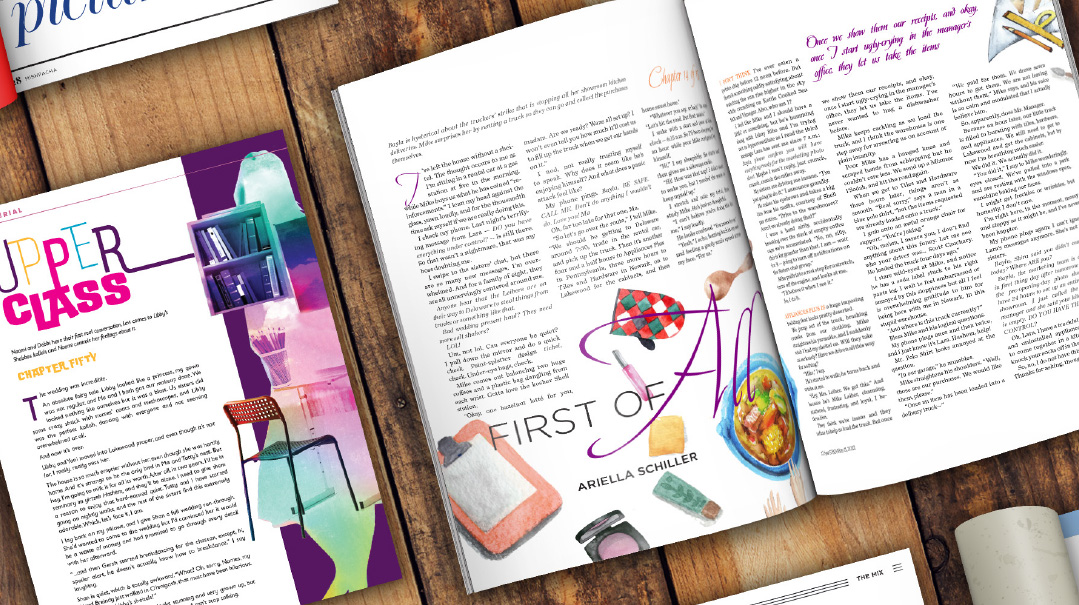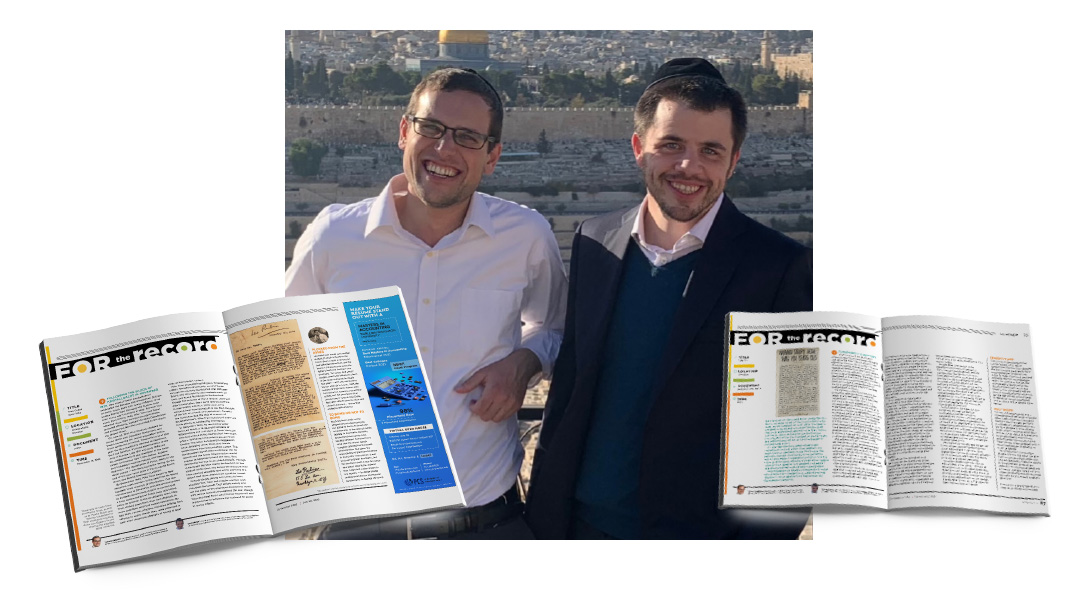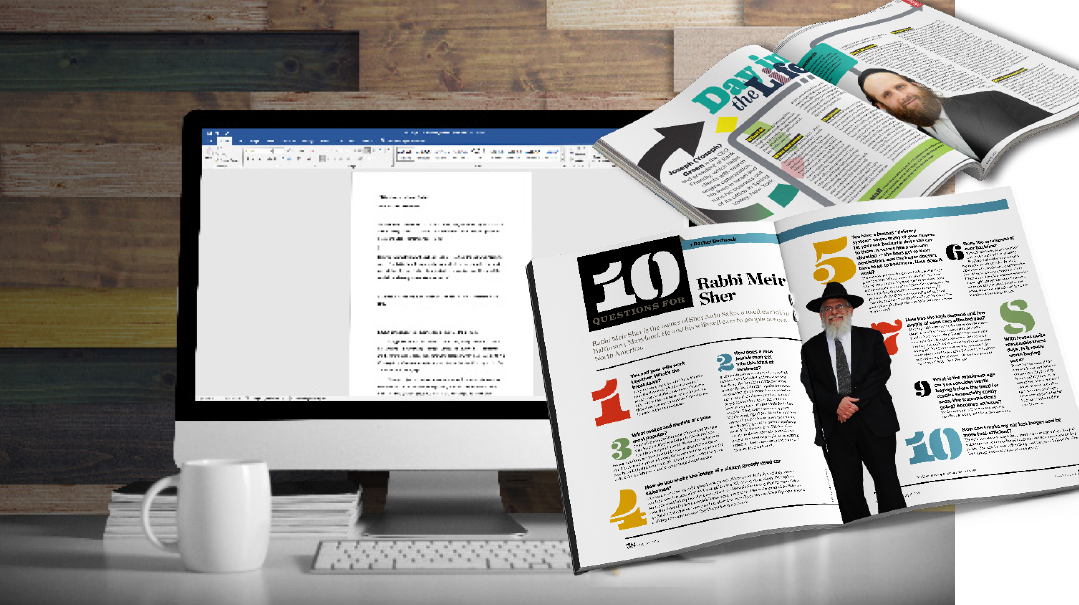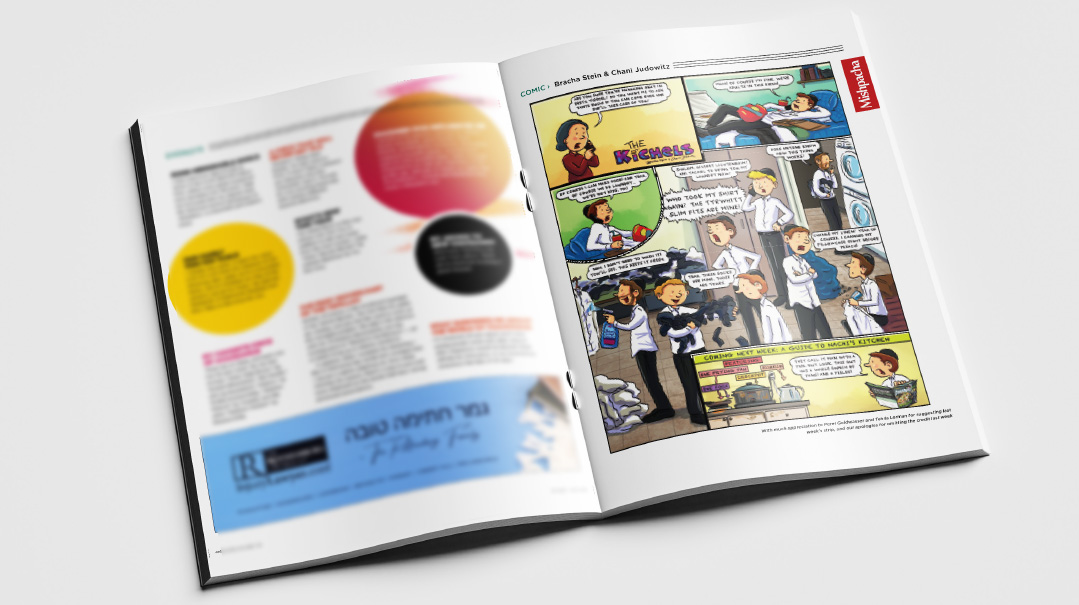20 Questions for Ariella Schiller
| February 11, 2025Ariella Schiller’s irresistible serials keep readers coming right back for the next installment of realism, insight, and humor

Ariella Schiller’s irresistible serials keep readers coming right back for the next installment of realism, insight and humor, whether they read Cozey, Family First, or the main magazine. But this incredibly talented writer, who is based in Yerushalayim, also offers intriguing features and absorbing Calligraphy stories. Do her Second Guessing columns really leave readers mulling over the right course of action for days? Read on for the answers — but in short, yes.
My ideal work environment
A quiet coffee shop, some light jazz playing, and just me, a computer, and coffee refills.
Deadlines make me…
move. Like, fast. Otherwise, it’s a procrastination game.
The accomplishment I’m proudest of
When my article on housing the Northern refugees made it onto the cover of the main magazine. I think it was my first cover story. I was proud to be a part of Am Yisrael, proud to have been chosen to write about this topic, and proud of its placement.
The best piece of advice I got
In terms of writing, it was that concise is key. Don’t say something in seven words if you can say it in five. And in terms of life: Don’t overthink. Get out of your head. It’s so simple, yet it’s changed my life.
1
What is your role at Mishpacha?
Well, if you look at the credits, it lists me as a contributing editor, which I guess is a fancy term for staff writer. I write for the main magazine, Family First, and Cozey, as well as advertorials and in-house writing like staff emails and newsletters. My fiction serials are weekly, but interviewing nature photographers or sitting in the Central Bus Station with an ex-Egged bus driver are the feature topics that keep life exciting. And of course, advertorials on kevarim tours, Botox, and water coolers are how we keep the wheels greased.
2
What is your weekly work schedule?
Writing, writing, conducting interviews, and then, just for kicks, some additional writing. On Sundays I usually work on several serials, on Monday I do private editing, Tuesday or Wednesday is when I’ll go out to interview for features, and Thursdays are at the office for a change of scenery and occasional meetings where I get to spend time with the best coworkers.
3
What kind of feedback do you receive most often?
Complimentary, baruch Hashem. “I love your writing — my husband and I debate it Friday nights!” or “My teenage daughter is obsessed.” Also, there is always a little surprise that I am me — and I never know if that means I’m too old, too young, too brunette, or too short, but either way, there’s always that.
4
How far in advance do you plan a serial — and more important, do you always know how it will end?
Before I sit down to begin writing a serial, I need to know who the characters are and what it is I’m trying to convey to my readers — I always have a message or something I want to share. Just today someone emailed me to say that they’re pleasantly surprised to see that Picture This, my current serial in the main magazine, is not just a cutesy story. I was actually shocked anyone would think Mishpacha would publish a story just for the sake of a story! There’s always tochein, always something to learn.
Of course, my incredible editors need to know other things aside from my message, like plot arc, scene breakdowns, and character profiles. Sigh. When it’s time for a new serial, we have planning meetings, which are really just a two-hour schmooze about people who don’t exist and what their challenges and issues in life will be.
“Young divorce rates are such an issue these days.”
“Okay, how can we create a story that provides chizuk and assistance?”
Sometimes I walk in with a full serial sketched out in my mind — characters, scenes, colors — and sometimes I walk in like a dried-up well, and then Shana Friedman or Nomee Shaingarten or Bassi Gruen will say, “Well, what are you passionate about?” I feel like they usually regret asking me to get on my soapbox, but at least at the end of the day a story is born from it.
5
Who is your favorite character from all your serials?
I thought we’re not allowed to have a favorite child? But I truly enjoyed shanah rishonah Baila from First of All, my Family First serial that ran around three years ago — and was my first adult serial for the magazine. I think I admired her level-headedness, and I totally coveted her job — interior design! I also loved Rivka Ahuva, the teenage protagonist from Bricks and Stones, the first serial I wrote in TeenPages (now Cozey). She was so spunky, in an almost fairy tale-like way that I really enjoyed.
6
What cliché do you have to work really hard to avoid in your writing?
Descriptions. “My heart was racing a mile a minute,” “My palms were sweating,” “The room was cold and dark,” are so easy and they fall off the pen so well. But my efforts to avoid them do assist me in digging deeper. In avoiding the cliché, I have to really think about what is happening to a person when they are nervous. What feelings are they overwhelmed with, what is their body doing? So instead of “she was breathless with fear,” we end up with, “the fear made her feel empty, like there was a giant hole in her, in the floor, in everything, and if she moved, just a centimeter, the hole would swallow her entirely. And that’s all she would ever know, forever.”
7
Are you interested in reading your work once it’s in print or are you sick of it? And when you see your work in print, do you see things you wish you could change?
Usually, enough time has passed since writing a piece that I’m actually interested in checking it out in print. And I’m usually pleasantly surprised. Especially when I read my fiction, my comment to whoever is around is, “Omigosh, I’m really funny.” Which, of course, if you’ve met me, you already knew. Right? Sometimes, though, rereading is hard, knowing it’s out of my hands and essentially gone with the wind, there’s no taking it back. I’ve experienced regret at word choice or just general disappointment in the way I depicted a scene.
8
To what extent does your writing take over your life and headspace, if at all?
Oh, it definitely does. And then when an editor tells me something’s not realistic, I have to hold myself back from saying, “Wait, but that’s what happened! She really did burst out crying in the grocery!” I know when I was writing my last short story for the Calligraphy fiction supplement, Rachael Lavon was like, “Ariella, the husband did not start tearing up as they shared a waffle. Just no.” And I was like “Uh huhhh!” Until, you know, I remembered that it was fiction and Rachael was absolutely right.
9
Which one of your Calligraphy stories is your favorite?
“Broken Things” from Pesach 2023, about a young couple who lost their baby and the anti-smartphone movement. It was written after someone I know suffered a tragedy, and I feel like I actually poured my soul into it — which I think is reflected in the writing. It’s astounding to see the difference between writing and soul writing. It was almost like the entire story had been written already, and it was my job to just get it down on paper. It flowed so seamlessly and effortlessly, yet when I was done writing, I felt physically drained. After it appeared, someone who knew what had happened reached out to me and told me Hashem should bentsh me for providing healing. And really, that’s what I daven for: continued creativity and the ability to provide Am Yisrael with some chizuk, a little laughter, and maybe a good, healing cry.
10
What do you enjoy writing more, teen or adult fiction?
Tough call. I enjoy the freedom of writing for adults, which allows me to cover wider, deeper, more layered topics — I guess that’s adult life in general, right? — but I do feel a bit more comfortable writing for teens. What does this say about my maturity level? It’s more than comfort though; I think it’s a confidence. When I write for teens, I don’t even stop to think or feel, it just pours out. I can accurately feel things the way a teenager would. And when writing for adults, as I said, my editors are sometimes intrigued at the way I think a situation would play out. People are always surprised that I can still connect to teens in my old age, and my answer is: It’s not just because I research the trends and the slang. I think it’s because I haven’t yet forgotten that for a good five, six years, everything in your life feels huge, and no logic or deep understanding can penetrate that or change that. I think teens connect to that understanding.
11
What complaint do you get most often?
People sometimes tell me that the husbands in my stories are not believable: They’re too understanding, too complimentary, too nice. I think I may have contributed to some shalom bayis issues, and I apologize for that! But really, I get complaints about just about anything that people feel like sharing, that I did too much of this or too little of that. One of the numerous letters I received about Picture This wasn’t as complimentary as the others, and it definitely stung. I remember speaking about it with friends and family, trying to process it, and all of their amazing advice boiled down to one thing: Just focus on what you know you’re trying to accomplish with this serial. Don’t let the outside noise, however loud and biting, cloud your clarity — and that helped me just roll the letter off my back. I’m secure in the knowledge that I have rabbinical backing to my story, that I have the erlich direction of my excellent editors, and that I’m trying to provide chizuk for a prevalent issue, not, chas v’shalom, expose something meant to be private.
12
Who has been a mentor for you in fiction writing, feature writing, and editing?
I took Avigail Sharer’s fiction course several years ago, and I was able to see a real difference in the quality of my writing after that.
I work with Shana Friedman on features, where I learn so much about the science of writing — yes, it’s an actual thing — and I’m privileged to work with Bassi Gruen on my serials, which feels like my own private writing coach. From phone planning sessions to in-person meetings to just constant cheerleading and coaching, my writing today really is what it is because of Bassi’s hard work. I don’t know about other writers, but I sometimes feel lost in the possibilities. There are just so many words, so many choices, so many different ways I can describe something. How do I know if this is the best one or if I should keep trying? And Bassi has this incredible clear sight — she either loves it or really doesn’t, and it’s like having a writing compass. In terms of writing techniques, I very much credit my Touro college professor, poet Yehoshua November, with whom I took all my comps and lits, as well as poetry and creative writing. Professor November very much stresses the sanctity of language, how words themselves can be art, if just lined up in the correct way, and I think the poet in me truly connected to that.
13
What is something you wrote that has stayed with you?
My first piece ever published with Mishpacha was a personal essay in Family First. I wrote about the time the piece of paper with the Tehillim names of the three boys, Gilad, Eyal, and Naftali Hy”d, who had been kidnapped and murdered a year earlier, had fallen out of my siddur and off the porch. Even though I knew they had gone to a Place where they no longer required my desperate tefillos, I ran down two flights of steps to get the paper back. I needed the reminder of a time when I truly felt the pain of another Jew, because only a year later, those raw emotions had been dulled. Those thoughts have been ringing truer every year since then, unfortunately. Now I also think about whether, if I had only known the pain that lay ahead for Am Yisrael in the years after their murder, I would have run down to get that paper. Or would I have given up then and there?
14
Is there a story you wish you could run, but never will?
I guess anything that could truly hurt anyone I care about. There are so many ideas I have, but I stop myself from even getting near them, knowing they would step on someone’s toes, hurt someone’s feelings, or leave someone feeling blamed or called out. Anything referencing difficulties in childhood or marriage or family dynamics…. Even if they are not based on personal experience, I know it would be hard for those around me to differentiate, and rightfully so.
15
Is there a scene or a story you wish you hadn’t run?
There was one segment I wrote for my Second Guessing column — a monthly column in Family First where I depict a relatable scene that leaves the reader wondering if there was any way the protagonist could have dealt with the situation differently — that had three different people convinced I had written about them. It was about a sister who didn’t want to babysit, and the three people who reached out after they read it were not amused. (Again, if you’re reading this, it wasn’t even my plot idea; Family First editor Adina Lover had suggested it!) There was also the time that I actually did base a Second Guessing on a true instance — after receiving permission, of course — and then it was too hard for them to read about themselves and it got sticky. I’ve learned from that… just stay away from writing about people you know. It doesn’t end well.
16
Can you share some of the crazy and far-out research you’ve done for features?
Most On-Site pieces — the ones where I travel somewhere to check something out so I can share it with our readers via photo essay — are fun and there’s always some element of surprise. I think the biggest surprise was when I met with forager Shmuel Chaim Naiman for a write-up at the end of this past summer and then found myself on a three-hour hike in the midst of the desert near Beit Shemesh — good thing I wore sneakers! The Vinia supplement factory tour and write up were also fascinating — my husband and I went to Yavneh during summer bein hazmanim, it was basically our trip for the day. We had to wear scrubs and go through a whole shoe-washing and purification process before entering the factory floor so they could show us the process of how they create their product, a grape-based supplement with multiple health benefits.
17
Who have you met in your capacity as a writer who made a lasting impression?
So very many people. Sossy Karako, who dedicates his time to returning lost objects left on buses here in Israel. The founders behind the Smach Zevulun initiative, pairing up Yissachar and Zevulun families in an age-old partnership of learning Torah while being supported by a brother in the work force. All the incredible people involved in the OneFamily Fund that supports terror victims. That is the amazing part about writing features and articles: Your eyes are opened to all the special people who surround you but you don’t usually notice, because you’re busy writing fiction in your head.
18
What type of writing do you find most difficult?
Writing a feature about a topic I just don’t connect to is definitely a challenge, like something money or food related. Those just aren’t topics that interest me. I’m investing so much and interviewing so many different people about their experiences, but I probably would not have read the feature if I saw it in a magazine as a reader. But I remind myself that you can always find something to connect to in a situation — you just need to be willing to put in the effort. Sometimes I do, and sometimes I just grump and kvetch while I write. Guess which one I do more.
19
What is your favorite issue of Mishpacha?
The Pesach issue — although it takes everything out of the team and then some — leaves me with this all-encompassing sense of satisfaction and triumph. We create something huge, something magnificent, that will be enjoyed by tens of thousands around the world. The many planning sessions, both in person and on Zoom, have come to fruition, the hours of proofreading, the 12-hour-straight shifts of the graphics team, the sleepless nights of Production, and of course, the weight of multiple deadlines for the writers, have culminated in something real, something tangible. There’s no comparison to that feeling.
20
What’s the most heartwarming feedback you’ve ever gotten?
When I was writing Trust Fund, my main magazine serial about the son of a wealthy family who walked away from a life of financial comfort in order to gain independence, a woman wrote in to say that she’s clipped every chapter and rereads them in order to glean chizuk, as she was living a similar situation. I was blown away by that. Another time, the wife of a choshuve rosh chaburah told me that her husband read the Second Guessing column I wrote from the point of view of a woman whose husband who was very limited, so she chose not to tell him that their incredible friends needed help with an errand. She said he’d been mulling it over for several days — it really gave him food for thought! I think it comes down to acknowledging that our words go so much further than the pages of a magazine.
20 Questions for 20 Years
Coming up: Cindy Scarr
Send your questions to 20years@mishpacha.com
(Originally featured in Mishpacha, Issue 1049)
Oops! We could not locate your form.







